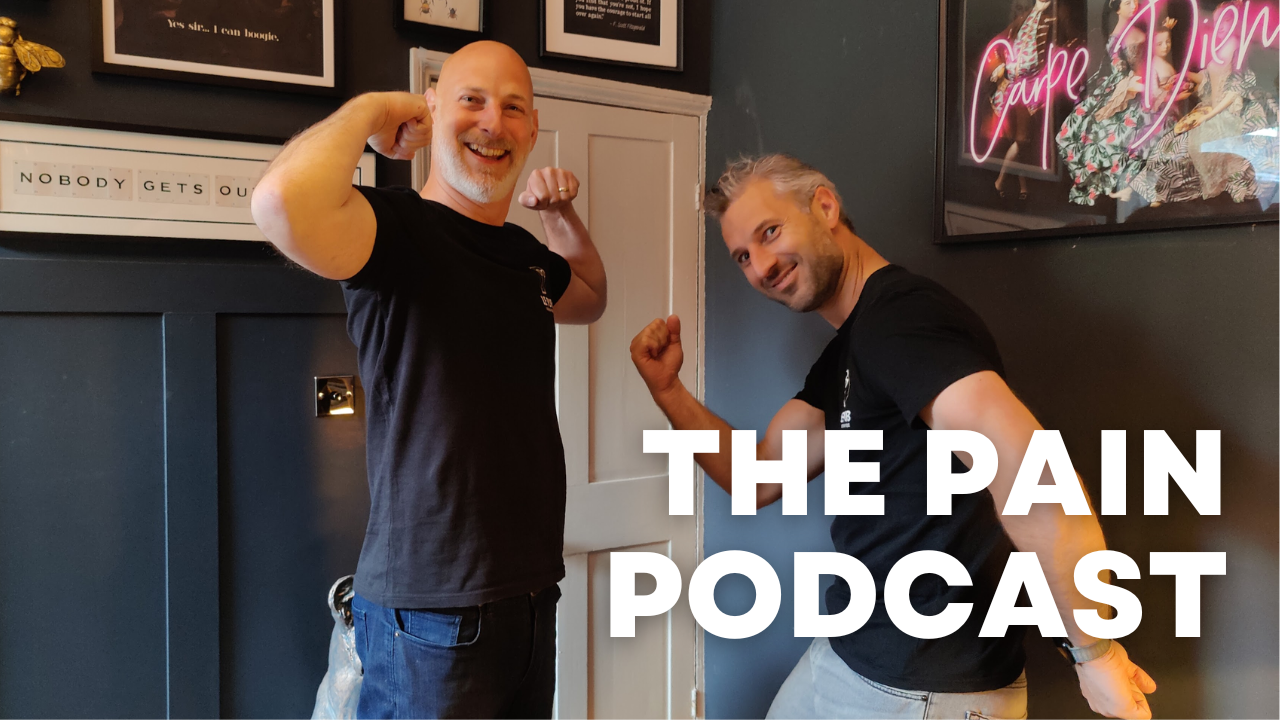Tim: Welcome to Painful Truths, our new podcast. I'm Tim, and with me is Bart from leupsi and defeat. We're sharing our opinions about different statements relating to pain. Today's painful truth is the statement "Can't go wrong getting strong." What does that make you think, Bart?
Bart: It's interesting. Arnold Schwarzenegger said that once. I watched his Netflix biopic recently - fascinating stuff.
Tim: I haven't seen it, so don't spoil it. But let's think about this statement. If you're in pain and you see a clinician - we're both physiotherapists specializing in pain - how might you feel if they say, "You need to get stronger, you're too weak"?
Bart: That's a good point. Many people might think, "I'm just too weak, I can't get to the gym." But that's not correct. I see athletes with chronic pain who are very strong. There's truth in the statement, as exercise can create huge changes, but how you apply and conceptualize strength matters.
Tim: You've already shared your opinion there. I agree, we need to do better with statements like that. It's more nuanced. It might be about being strong for life, having the capacity to deal with life's stresses and challenges. After COVID, many of my clients are finding life really hard. If there are too many challenges, things start to break down.
Bart: Absolutely. It's a global observation. These statements create a feeling that you can do something, which is positive. But if you've tried many times without results, it becomes harder. It creates a boundary between expectations and what a pain-informed clinician can actually do.
Tim: Even the word "exercise" can bring up barriers for some people. There's strong evidence that stronger, fitter people are healthier and live longer. But historically, people weren't hitting the gym, they were just working hard. I recently started an allotment, and I noticed how weak I was for that specific task. Now I see that as my exercise - it's pleasurable and I'm doing good for myself and the allotment.
Bart: From a patient perspective, not feeling strong enough can make you feel vulnerable. Patients often say it feels like pain can hit at any moment, which creates a feeling of not being safe. When you do feel strong enough, it's like you can handle anything. But when you don't, it feels pretty bad.
Tim: Yeah, and there's a difference when you're in pain. Going through a painful procedure to get stronger is different from the good feeling after a regular workout. We need to dig into this more.
Bart: Absolutely. I've been talking to people who are experiencing flare-ups when they start new movements. There's a real challenge in knowing how to engage, how much, and what type of movement when you're in pain. The statement "Can't go wrong getting strong" is much more nuanced than that.
Tim: I agree. It's like telling someone they'll be better in two months after trying. If they don't feel better, why should they continue? There's also the nociceptive aspect of exercise, which can be tricky for people with lower pain thresholds. How can we ensure patients will be fine if we're asking them to go through pain?
Bart: It's challenging. We need to manage expectations better and be more ethical. We wouldn't accept a surgeon saying they don't know if a surgery will work, but we do painful exercises with patients. We can damage people if we're not careful.
Tim: Exactly. There's the risk of associating movement with pain. It's counterintuitive to tell someone to do something painful when they're trying to get rid of pain. Not everyone gets that endorphin rush from exercise either - for some, it's just hard work.
Bart: Coming back to our original statement, "Can't go wrong getting strong," there's some credibility to it. It would be wonderful if we could all engage in activities that make us feel strong and robust. But for those already experiencing pain, we need to significantly nuance that statement.
Tim: I see a lot of Instagram posts claiming certain exercises will make pain go away. What's your opinion on that?
Bart: It's [expletive]. I can't watch it because it hurts. The exercise could be fine, but claiming it as a cure is unethical. It's simplistic and unfair, guiding people through a process they think is right, only to find they still have pain. It makes patients feel strange, like they must be really bad if they've done everything Instagram said and still have pain.
Tim: I agree. It makes me feel sick to see such blinkered thinking. It's problematic when we're dealing with persistent pain.
Bart: It's driven by marketing. It's hard to bring nuance when you're trying to sell something. It's creating a space for nonsense, selling one-size-fits-all solutions. People feeling bad want quick fixes, which always appeal more than complex solutions.
Tim: Thanks for sharing. If you're a clinician struggling with this statement, or a person in pain, I hope you've heard some thoughts that resonate. Don't blame yourself or think you're doing something wrong. Exercise can be helpful, but it should be thought out specifically for you.
Bart: Exactly. This has been Painful Truths, where we figured out our opinions on "Can't go wrong getting strong." Thanks for joining us.
Tim: Thank you, hope you enjoyed that. See you next time.

